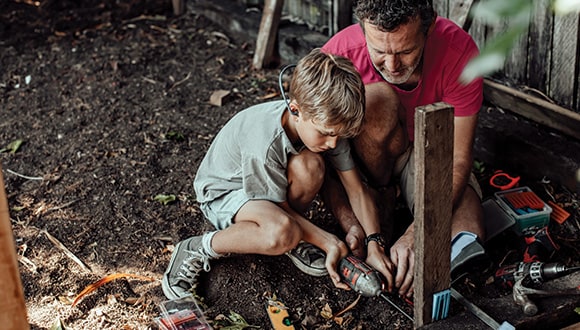15 family bonding activities for you and your kids
Bonding with your kids not only feels good – it’s essential to help them feel secure and well adjusted as they grow. Here’s how to strengthen your relationship.
Whether they’re toddlers, tweens or teens who barely talk at dinner, children of all ages usually want their parents to be available and reliable, according to Elizabeth Shaw, CEO of Relationships Australia. “Social connections help form a child’s identity and self-esteem,” says Elizabeth. “So, when parents take time to be with their children, it makes them feel more secure and valued.”
There are many ways you can make your connection with your child or children more meaningful. Doing activities together that spark deeper conversations and observations is a great place to start, but working on the little ways you can build your family bond daily will have a big impact.

How to strengthen your bond with your child
Making meaningful connections isn’t always about what you do, but the way you do it. You could be having a one-on-one day with your child doing something special like visiting a museum, but if you’re looking at your phone most of the time, then it’s not really strengthening your relationship.
These everyday habits are good ways to boost your connection with your child:
1. Put down your phone
Unsurprisingly, research shows that connection with your kids drops when you’re distracted by your phone while on a family outing. A study conducted at Boston Medical Centre observed 55 different groups of parents and young children eating and found that when parents were distracted by a device at dinner, they had 20% less conversation with their child and 39% fewer non-verbal interactions.
Most parents share this struggle and, while it’s unrealistic to switch your phone off most days, try to pick a few chunks of time each day to hide your phone away. It could be when you’re at the park together or while you chat about the day. No phones at the dinner table is always a good rule too.
2. Factor in fun
Use family activities as a launch pad for fun – try washing the car together and having a water fight or making the bed and enjoying a pillow duel. “Afterwards, say, ‘That was fun’ or ‘Glad we did that together’,” says Elizabeth. “This will help your child feel special and seen.”
3. Express affection
Use pet names, give hugs, back rubs and winks and praise your child for things like their gentleness with the family dog or sense of humour, not just for tidying their room. Research from the University of Iowa found that infants who have a close, intimate relationship with a parent are less likely to be troubled, aggressive or experience other emotional and behavioural problems when they reach school age.
4. Have a real conversation
This shouldn’t just be about school, but about something your child is interested in, like the planets or a band they’re in to. Ask your child’s opinions and respect them. Make eye contact to show you’re listening.
5. Enjoy one-on-one time
“If you have more than one child, take turns to have special time with each,” says Elizabeth. This might mean you play basketball with your child who loves sport and make a cake with your child who likes baking.
6. Share your world
After you’ve asked your child about their day and responded, talk about your day as well. “This helps create a feeling of equality, which builds connection too,” says Elizabeth.
7. Slow down in nature
Enjoy cloud-watching, jumping waves at the beach or eating breakfast together in the garden. Encourage your child to be mindful by noticing the sounds, sights and smells of the outdoors. A study published in Scientific Reports found that spending at least two hours a week in nature benefits your health and wellbeing.
Through these activities, if you notice your child is having trouble managing big feelings, HCF members who have hospital or extras cover can access Calm Kid Central*, an online educational and support program helping kids aged 4 to 11. The program provides confidential access to an experienced child psychologist who can answer your questions within 48 hours, as well as tools and resources to help you support your child.

Family bonding activities
How do you bond with your child if they seem more interested in texting with their mates and looking at YouTube? Invite them to choose two activities for the family for every one activity you choose. When it’s your turn, try these fun and meaningful activities that encourage them to connect with meaning and purpose in life.
8. Explore a museum
Interactive exhibits, unknown worlds and hands-on play are wonderful learning experiences for kids of all ages. Museums spark your child’s imagination and sense of history and will hopefully make them more likely to visit museums as adults.
9. Work together on a family DIY project
Creating a vegie patch, building a rock garden or putting together furniture builds life skills and encourages teamwork (not to mention tests everyone’s patience). Let your child take ownership of some key decisions, like choosing the paint colour for their room or picking out a new doona cover and some scatter pillows.
10. Volunteer together
As well as getting you all out of the house and away from screens, helping out at the local toy-swap initiative or community garden with your kids is a great way to encourage them to think about others, and increase their empathy. Research published in 2020 found that people who volunteer experience a boost in their mental health.
11. Read a book out loud together
Sharing your love of books can support a solid parent-child relationship, according to research. Take turns reading chapters with older children and let younger ones read certain words and turn pages. Try a whole series like Harry Potter or Ruby Redfort. Or, choose individual books by a favourite young adult author, like John Green, or interactive picture books.
12. Sign up for a charity fun run
Train as a family for an event like a fun run or charity walk. Even if you walk some of the route, you will get fitter and enjoy giving to your community, which has many positive domino effects.
13. Enjoy a monthly theme night
Go all out. If the theme is ‘the 70s’, make French onion dip, ham and pineapple pizza and pavlova and find some flares or tie-dye to wear. Even if your teen refuses to dress up, they will get a laugh from seeing your outfits and attempts to do the bus stop.
14. Look through old photos and videos
Telling family stories about when they were born or your own childhood and history helps to strengthen your emotional bond. It also helps your child build their resilience muscle, research from Emory University says. The results showed the more that children knew about their families, the higher their self-esteem and sense of control over their lives were. Sharing stories of how family members overcame challenges or persevered through hard times are really valuable for teens (who are listening, even when rolling their eyes).
15. Take regular breaks
Go on day trips to caves, lakes, mountains or scenic gardens. En route, look at interesting bridges or landmarks. Try a farm stay and enjoy the experience of feeding the chickens or moving bales of hay. If money is tight, organise a house swap with another family for a night or weekend to enjoy a change of scenery.
The podcast parents need
Becoming a parent can be both the greatest and hardest thing you’ll experience. In our Navigating Parenthood podcast, parents and experts share their stories and advice for making peace with the juggles and struggles of parenthood, from babies to teens. You can listen on your device through Apple Podcasts, Google Podcasts and Spotify.
Words by Stephanie Osfield
Published December 2022
Related articles
CARING FOR YOUR TEEN’S MENTAL HEALTH
Recognising emotional issues early is the best way to protect your teenager against depression and anxiety.
NAVIGATING BIG CHANGES FOR YOUNG KIDS
Expert advice for parents on helping our kids get through the tough times.
IMPORTANT INFORMATION
* Excludes Accident Only Basic cover and Overseas Visitors Health Cover.
This communication contains information which is copyright to The Hospitals Contribution Fund of Australia Limited (HCF). It should not be copied, disclosed or distributed without the authority of HCF. Except as required by law, HCF does not represent, warrant and/or guarantee that this communication is free from errors, virus, interception or interference. All reasonable efforts have been taken to ensure the accuracy of material contained on this website. It’s not intended that this website be comprehensive or render advice. HCF members should rely on authoritative advice they seek from qualified practitioners in the health and medical fields as the information provided on this website is general information only and may not be suitable to individual circumstances or health needs. Please check with your health professional before making any dietary, medical or other health decisions as a result of reading this website.